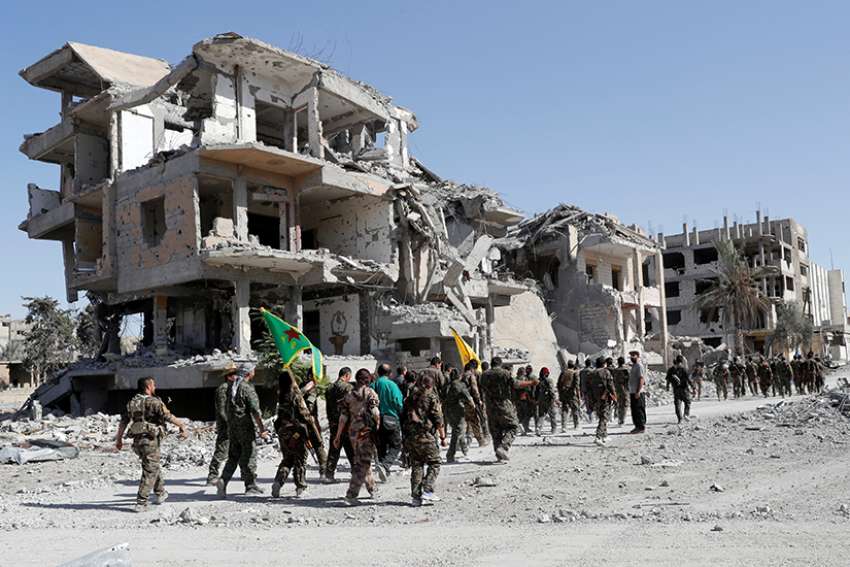The house fire that took the lives of seven Syrian children on Feb. 19 brought disbelief and unimaginable pain to the city of Halifax and the entire province of Nova Scotia.
The tragic story involved the death of children aged four months to 14 years, but it started in war-torn Syria. Ebraheim and Kawthar Barho and their six children fled the northern Syrian city of Raqqa that serves as the headquarters for the militant Islamic State of Iraq and the Levant (ISIL). With the support of Canadian sponsors, the family arrived in Nova Scotia in September 2017, settling in Elmsdale, north of Halifax.
It’s almost impossible for Canadians who often take for granted this country and what it has to offer to envision the emotions of the Barho family upon arrival. They fled from the only country they had ever known, fleeing a city almost totally destroyed during the Syrian Civil War.
Their new world held the promise of a better life, a safe existence in a strange land. Shortly after arriving, Kawthar Barho told the local newspaper that Canada represented “happiness.”
“We couldn’t imagine how good it is,” she said. “We feel like we’re at home already.”
The family moved to the Halifax community of Spryfield in 2018 but planned to return to Elmsdale in early March. Tragedy ended that plan.
Ebraheim Barho, severely burned in the fire, underwent a third skin-grafting surgery in early March. He faces a long road to recovery. Kawthar Barho escaped serious injury but the emotional heartbreak of losing seven children seems an almost impossible hill to climb. Lost in the fire are Abdullah, the four-month-old baby born in Nova Scotia, Rana, 3, Hala, 4, Ghala, 8, Mohammed, 10, Rola, 12 and Ahmed, 14.
Leno Ribahi, an Elmsdale businessman and respected humanitarian who immigrated to Nova Scotia from Lebanon nearly three decades ago, is president of the Hants East Assisting Refugee Team (HEART) that brought the family to Canada.
“I’ll miss the presence of those children so much,” he told the Chronicle Herald newspaper. “They used to come to my house and turn it upside down but I always had a smile on my face when they left. They were so loving and so full of life.”
Hundreds of thousands of dollars in donations have been gathered for the grieving parents. Relatives from Syria have arrived to help Kawthar cope, as stories abound about how construction of the building, the heating system, safety measures and human actions may have played a role in the fire.
When cause, effect and mitigation of tragedy are broached, the question of how could God let this happen is never far from the surface. We often want to hold on to the naïve notion that someone must be in control of the unexplainable, the unfathomable. But terrible things happen and God is not directing them. He’s always there for us, watching over us, helping us if we let Him, but He does not directly orchestrate everything that happens.
More than 2,000 people, many from the local Muslim community, attended the public funeral at the Cunard Centre, near the site of historic Pier 21 that has welcomed hundreds of thousands of immigrants to Canada. The service was held in English and Arabic. Shiekh Hazma completed his English sermon with a message that might have alluded to universal hardships faced by immigrants.
“Life is so short,” he said. “There isn’t enough time to love. I don’t know where people find time to hate.”
With seven white coffins placed in front of the congregation, the outpouring of emotion transcended nationality and religious persuasion.
“Today, we feel the pain of losing these children and, for many people here, they feel the pain as if it were their own children,” said Sheikh Abdallah Yoursi.
“Muslims have very detailed beliefs of what happens after we die. We believe that children, although in their graves, can hear our prayers.”
Those gathered to pray, be they Muslim or Christian, could find solace in the belief that seven children are enjoying the promise of a rewarding afterlife.
(Campbell is a reporter at the Halifax Chronicle Herald.)
Support The Catholic Register
Unlike many other news websites, The Catholic Register has never charged readers for access to the news and information on our site. We want to keep our award-winning journalism as widely available as possible. But we need your help.
For more than 125 years, The Register has been a trusted source of faith based journalism. By making even a small donation you help ensure our future as an important voice in the Catholic Church. If you support the mission of Catholic journalism, please donate today. Thank you.


